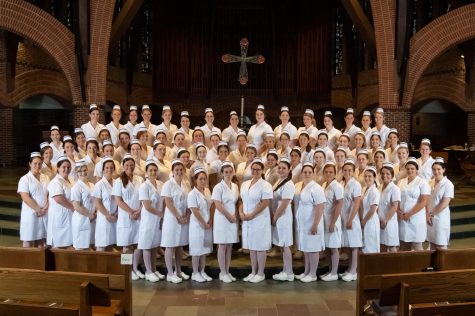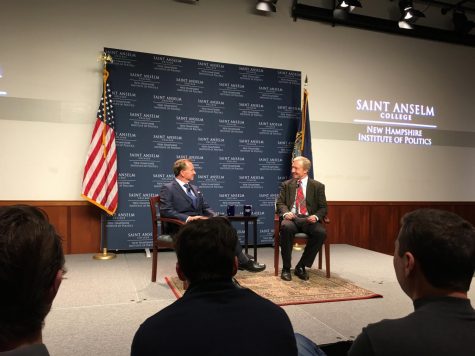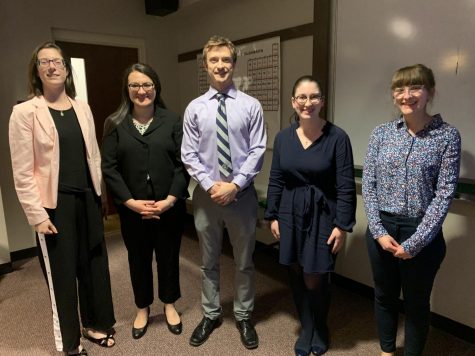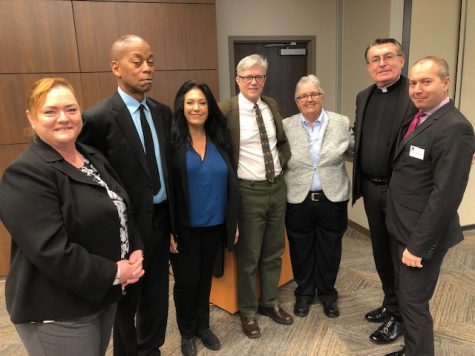Students participate in social innovation workshop
November 28, 2018
On Wed. Nov. 7, the Center for Ethics in Business and Governance along with the Diversity & Inclusion Initiative Fund co-sponsored a workshop called “Design Thinking for Social Innovation.”
The event was hosted by Professor Frutos-Bencze from the Department and Professor Flannery from the Psychology Department.
“When I was on sabbatical a few years ago, I learned about design thinking initiatives taking place at liberal arts colleges across the country,” Prof. Flannery said. “After conducting interviews with some of the leaders in the field, reading extensively, attending workshops, and taking a few courses I was convinced design thinking belonged in higher education. Thus, I decided to bring design thinking to Saint Anselm College to introduce the methodology to students and colleagues to support social innovation, but also to provide experiences for increasing student’s creative confidence.”
“I am interested in entrepreneurship and innovation in the business context,” Prof. Frutos-Bencze explained. “Prof. Flannery’s perspective about innovation and creativity seems more influenced by cognitive science. I think the design thinking (DT) approach is useful to any discipline, but it’s been often used in business. We wanted to expose a diverse group of students to this approach. The skills learned through the DT approach are very marketable, and these days employers are interested in such skills.”
Prof. Flannery added, “I am a Cognitive psychologist, which means I study how people think in all different kinds of ways, e.g., memory, attention, imagery, etc. And, we know quite a bit about how to help people improve their memory spans or increase their focused attention. When it comes to creativity, I think ‘improving it’ starts with embracing some of the mindsets set forth in human-centered design and providing people with opportunities to practice the mindsets in everyday life. With practice, I believe people will gain creative confidence and discover they can be solution finders.”
The workshop divided participants by table and gave each group a facilitator, from numerous departments on campus. “All facilitators were volunteers,” Prof. Frutos-Bencze said. “We sent out a call to faculty and administrators and whoever was interested in participating worked with us. Prior to the workshop we met with the facilitators to go over the workshop and the guidelines. We had additional ‘facilitator’ notes for them. Without them, we really wouldn’t be able to run the pitch competition, nor the workshop.”
Because the facilitators were trained beforehand, they were all able to help their groups move through the packet that was handed out at the beginning of the workshop to correspond with a PowerPoint.
After explaining what the DT approach is and introducing everyone to their teammates, the teams were given example “How Might We…?” (HMW) questions that corresponded with correcting issues on campus. The examples given in the PowerPoint were as follows:
-How might we improve recycling habits?
-How might we support healthy living?
-How might we inspire experiences and expressions of inclusivity?
-How might we re-imagine learning in the 21st century?
Participants worked with their teams to choose a HMW question and then discussed appropriate interview questions ranging from general questions to deeper questions with their team before leaving the event space to interview students.
After the interviews, the teams discussed themes and insights they gained from the student interviews in order to rework their HMW statement to something more specific before prototyping a way to help with the issue.
Finally, the teams created a marketing pitch script to read as if they were trying to sell their prototype.
Prof. Flannery explained the importance of teamwork and students working with individuals they may not have been familiar with before the workshop: “When a diverse group of students work on a challenge together their different experiences bring multiple perspectives to the table; the group’s solution draws from everyone’s contributions.”
This workshop was beneficial in teaching a new way of thinking to students and both professors believe in the importance of workshops such as this one.
“Although I think there could be a structured ‘course’ about design thinking, I think informal formats (i.e. workshops) allow for a different kind of interaction between faculty/administrators and students,” Prof. Frutos-Bencze shared. “There’s less pressure for a ‘grade’ (as in a course for credit format), thus tends to be more ‘fun’ (I hope!). Often the skills learned through these workshops are very practical, applicable to many situations, and useful to any major.”
Prof. Flannery further explained, “The workshops introduce students to human-centered design, which enables them to engage in solution finding vs. solution vetting, the latter of which we are very accustomed to doing despite being somewhat unaware of whom we are producing the solution for and what they might need. The workshop is ‘hands-on’ and requires students to adopt new mindsets such as embracing ambiguity or learning from failure. We hope by the end of a workshop students are inspired to use some of what they have learned about design thinking in the future for projects they might want to launch to improve the lives of others.”
This event was a great way to get experience for another event happening on Jan. 26, 2019. Prof. Frutos-Bencze explains the Social Pitch Competition:
“The event in January is an actual “pitch competition.” We have judges (change makers and innovators from NH) who listen to the different pitches and select 3 winners. There are cash prizes for the winning teams. This is a one day event (Saturday). During the day students use the design thinking approach to either come up with an idea or hone an existing idea (in the morning they usually get through the brainstorming stage). In the afternoon the teams have time to prototype their solution and create a 2 minute pitch. At 4:30 p.m. we begin the pitches. The pitches are open to the public so friends of the participating teams can come to support them. The teams have the opportunity to request additional funding from the CEBG (application form available) to further work on their idea. The pitch competition is really an “idea” competition. Students can register as a team or individually. Registration will be open after Thanksgiving. If they sign up individually we put them in teams just as we did for the workshop.”
“The Pitch Competition is a wonderful opportunity for students to take on a challenge with team members they may have never met before and by the end of the day present a solution in the form of a pitch,” added Prof. Flannery. “I am looking forward to seeing what challenges the students will pick this year and the people they will gain inspiration from when they go out to conduct interviews. Beyond the Social Pitch Competition, I would like to see more workshops on campus specifically geared to various phases of design thinking, such as gaining empathy or prototyping. This would give students more time to engage in activities, as well as reflect upon what they have learned. It would be wonderful to co-facilitate the workshops with folks practicing design thinking in their jobs or community; this would connect the practice of design thinking with real world experiences.”








